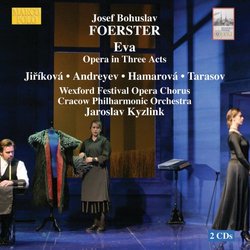| All Artists: Igor Tarasov, Roland Davitt, Josef Bohuslav Foerster, Jaroslav Kyzlink, Elizabeth Batton, Denisa Hamarová, Krakow Philharmonic Orchestra, Iveta Jiríková, Kostyanton Andreyev Title: Josef Bohuslav Foerster: Eva Members Wishing: 0 Total Copies: 0 Label: Marco Polo Original Release Date: 1/1/2005 Re-Release Date: 10/18/2005 Genre: Classical Styles: Opera & Classical Vocal, Historical Periods, Modern, 20th, & 21st Century Number of Discs: 2 SwapaCD Credits: 2 UPC: 636943530825 |
Search - Igor Tarasov, Roland Davitt, Josef Bohuslav Foerster :: Josef Bohuslav Foerster: Eva
 | Igor Tarasov, Roland Davitt, Josef Bohuslav Foerster Josef Bohuslav Foerster: Eva Genre: Classical
|
Larger Image |
CD Details |
CD ReviewsSmetana Meets Janácek and Produces a Real Winner! J Scott Morrison | Middlebury VT, USA | 11/17/2005 (5 out of 5 stars) "'Eva' is based on a play by Gabriela Preissová whose title can be roughly translated as 'The Farmer's Woman.' Preissová was the forward-thinking writer who provided the text for Janácek's 'Jenufa,' and the action takes place in the same area of Moravia as that better-known opera. There are plot similarities, however, with Janácek's 'Katya Kabanova,' in that, among other things, the heroine drowns herself in the final act. It's that familiar theme of a woman kicking over the traces to go with her lover, even though she is married, and finding out ultimately that society won't tolerate it. One would expect, then, that the musical setting of 'Eva' would be rather like those of Janácek's, but in fact it is rather more a nineteenth-century setting that is closer to 'The Bartered Bride' than to anything Janácek ever wrote. Josef Bohuslav Foerster (1859-1951) was slightly older than Janácek but his musical style seems much older even though 'Jenufa' premièred a mere four years after 'Eva.'
Be that as it may, though, this opera is a red-blooded, nationalistic, tuneful, eventful and glorious work. It was popular throughout Europe for a period after its première, and for longer in what eventually became Czechoslovakia, but it has been out of favor for a very long time now. We are grateful, then, to the Wexford Festival, a yearly event devoted to reviving worthy but long-unheard operas. I've not been terribly enthusiastic about some of the recordings that have come out of Wexford, for various reasons including poor recording and poor musical values, but this issue is a real winner. Not only is the opera worthy of revival (and even entering the repertory), it is given a beautiful performance here. Most of the participants are Slavs - the orchestra is the Cracow Philharmonic under Jaroslav Kyzlink - including a number of fine singers from what used to be called the Eastern bloc. Iveta Jiriková is a Slavic-sounding Eva -- her voice has that indescribable ping so common to sopranos from Prague and eastward, and it is perfect for this part. She has a lovely lyric soprano that can become more spinto when needed; her acting is a bit inward, even at times diffident, which is fitting for the part. Her ultimately wimpy lover, Mánek, is sung by Kostantyn Andreyev, a Russian, and his tenor is stalwart but also elegant. Samko, Eva's lame husband, is sung by Igor Tarasov who has a generally good voice but some dodgy intonation and steadiness at times; one could even argue that this is apt for the character, but I rather suspect is it simply a characteristic of Tarasov's voice. Mesjanovka (the Kostelnica-like mother-in-law) is sung to a fare-thee-well by mezzo Denisa Hamarová, and she appropriately chews the scenery in her portrayal of the strong-willed matriarch. Zuzka, the maid, is handled nicely (and with reasonable Czech diction) by the American mezzo Elizabeth Batton. There is a good deal of purely orchestral music in the score and it is played very nicely by the Cracow musicians. Kyzlink's direction is supple and sensitive. The Wexford Festival Chorus is made up primarily of Slavic singers and they are excellent. Sound is pretty good for a live onstage recording. There is some stage noise but it is not intrusive and it actually gives a touch of verisimilitude to the recording. If you like old-fashioned Czech opera -- say 'The Bartered Bride' or 'Rusalka' -- you'll like this opera. There is an old recording of 'Eva' on Supraphon, but I've not heard it and cannot compare it to this one. Scott Morrison" |

 Track Listings (17) - Disc #1
Track Listings (17) - Disc #1